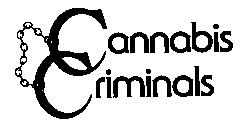| Books - Cannabis Criminals |
Drug Abuse

Foreword
The law is an imperfect social invention. Indeed, the law produces many social embarrassments that most of us successfully ignore. One of these embarrassments is the role our laws have played in creating what Patricia Erickson calls "cannabis criminals." Erickson has documented the details of this embarrassment in terms it may no longer be possible to ignore.
For example, did you know that by 1976 more than 100,000 Canadians had been designated "criminal" for simple possession of cannabis? Indeed, one out of every eight or nine adults charged with a crime in Canada in recent years has been pursued for their use or abuse of cannabis. Thus, while many of us assume that our attitudes, and therefore our laws, dealing with cannabis are changing, to date the latter has not been the case. Instead, Erickson demonstrates in this volume that the total criminalization for cannabis actually has increased, with increasing numbers of persons going to prison in Canada for cannabis possession. Yet imprisonment represents only the very tip of the "iceberg," and other types of dispositions have increased as well. Erickson reports that the great majority of "cannabis criminals" receive absolute or conditional discharges or fines. Many citizens may wonde; why we bother, and Erickson’s findings should raise this feeling from curio$ify to dismay.
Adopting the sensible standard of the Le Dain Commission, Erickson examines how the costs of criminalizing cannabis offenders in terms of their life experiences compare with the presumed beneficial deterrent effects of a cannabis prohibition. To this end, 95 Canadians sentenced for possession of cannabis were interviewed and their responses analyzed.
The implication of Erickson’s findings is astark indictment of the logic of our cannabis laws. What she finds is that being criminalized for cannabis possession has negative consequences for other aspects of the individuals’ lives, but no demonstrable deterrent effect in terms of the individuals’ cannabis use. Why, then, have these laws been enforced with such apparent enthusiasm?
Erickson’s argument here is provocative, providing what I believe is an important insight more generally into how good legislative intentions can produce bad law enforcement. The problem is that in Canada special police powers of search, the widespread availability of cannabis users, rewards to police for generating large numbers of arrests, and few restrictions on the admissibility of illegally obtained evidence in court all seem to encourage an aggressive seeking out of cannabis offenders. Unfortunately, the burden of the evidence reported in this book is that more problems are created than solved by this type of law and its enforcement. These findings should be considered carefully by the makers of our drug policy: they provide important guidance for change.
John Hagan, PhD
Department of Sociology
University of Toronto
University of Wisconsin
© digitalized by drugtext foundation
| Next > |
|---|












